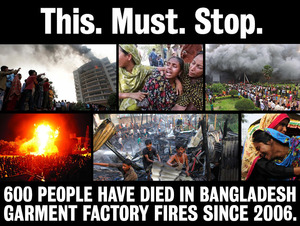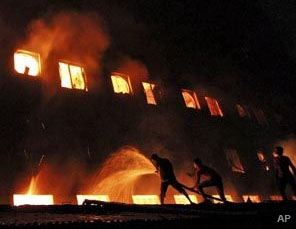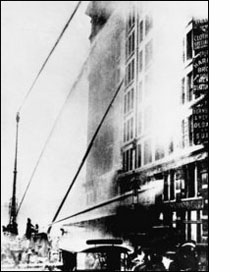LOCAL
End death traps: Hear Sumi’s story about Bangladesh factories
 By TOM GEIGER
By TOM GEIGER
Special to The Stand
Will you come out to meet Sumi? She has quite a story to tell. About jumping from a burning building. Not so much to save her own life, but so her parents would be able to find her dead body instead of it being charred beyond recognition inside the burned out factory where she spent her days making our clothes. She is coming to Seattle to tell her story and she wants you to be part of making history.
And Sumi is not alone. She will be joined by Kalpona — one of the brave and best worker rights activists in Bangladesh where this and many other fires like it have killed 600 garment workers since 2006.
Will you come to meet Sumi and Kalpona? Be careful. They might just change your life. But if you dare to become different then it might be worth your while.
 Sumi is a survivor from the Tazreen garment factory fire in Bangladesh in November 2012 where more than 100 of her fellow workers were killed making our shirts and pants. Some of the clothes they were making were headed for a Walmart near you.
Sumi is a survivor from the Tazreen garment factory fire in Bangladesh in November 2012 where more than 100 of her fellow workers were killed making our shirts and pants. Some of the clothes they were making were headed for a Walmart near you.
The point is not so much whether or not you shop at Walmart. The point is that millions do and Walmart is one of the largest purchasers of clothes from Bangladesh, which is the second largest producer of clothing in the world, after China.
The question is whether or not all workers have a right to a safe place to work? It is a simple question. Yet it is one of the oldest questions. Accidents happen. But what happened when accidents happen makes all the difference.
It is like when a person used to smash through the windshield of a car and fly to their death in a car wreck. And then some crazy consumer rights advocate started talking about seat belts and we all know how that ended. That’s right, hundreds of thousands of accidents happen still. But those people now longer fly through the windshield. Many of them survive. Indeed cars are now largely marketed to consumers based on their safety ratings. Imagine a world where clothes were marketed largely on the humane treatment of the workers who made them?
It is the same idea with basic workplace safety and fire protection standards that could be employed throughout Bangladesh. And if Walmart got behind passing this real reform, it would pass soon enough. Soon enough so the one hundred or so deaths a year in burning garment factories would stop.
 Will you come hear Sumi’s story? Maybe if enough of us hear it and take action, we can stop the deaths that will otherwise continue to happen. Would you be part of that?
Will you come hear Sumi’s story? Maybe if enough of us hear it and take action, we can stop the deaths that will otherwise continue to happen. Would you be part of that?
More than 100 years ago the Triangle factory fire in New York City killed over 100 young women. Their story not too different than Sumi’s in many respects. What would you have done back in 1911? Would you have been part of the sweeping changes of workplace safety laws across the nation that was ignited by those deaths. By those human “Thud – dead. Thud – dead” on the New York City sidewalks as young women jumped to their deaths at the end of a workday from a burning building.
Well, now is your chance. Come out to learn on Tuesday and take action on Wednesday.
OLYMPIA FORUM — All are invited to attend “End Death Trap Factories: Safe Workplaces for All,” a forum on Tuesday, April 23 at 9 a.m. in the Columbia Room of the Legislative Building in Olympia. Sumi and Kalpona will explain their working conditions and how a SweatFree Purchasing Policy supports worker health and safety and labor rights in Bangladesh. Learn more.
UW FORUM — An evening discussion with Sumi, Kalpona and others to talk about how change must and can take place in their nation and around the world to improve working conditions in the Bangladesh garment factories. It will be Tuesday, April 23 at 6 p.m. in Room 260 of the University of Washington’s Savery Hall (just off the Quad).
WALMART ACTION — Sumi and Kalpona will join with a group of community leaders as they go to Walmart in a show of solidarity and support for Bangladesh workers who have died in the factory fires and take action to change Walmart and make it an accountable and transparent corporation. It will be Wednesday, April 24 at 10 a.m. at the Renton Walmart, 743 Rainier Ave. S.
Tom Geiger is Communications Director for UFCW Local 21, Washington state’s largest private sector union more than 43,000 members working in grocery store, retail, health care, meat processing, and other industry jobs.





